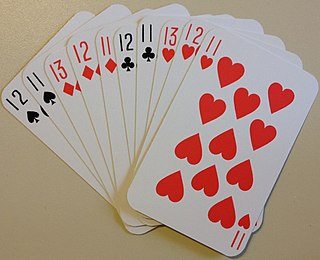 W
W500 or five hundred, also called bid Euchre is a trick-taking game that is an extension of euchre with some ideas from bridge. For two to six players, it is most commonly played by four players in partnerships, but is sometimes recommended as a good three-player game. It arose in America before 1900 and was promoted by the United States Playing Card Company, which copyrighted and marketed the rules in 1904. 500 is a social card game and was highly popular in the United States until around 1920 when first auction bridge and then contract bridge drove it from favour. 500 continues to enjoy popularity in Ohio and Pennsylvania, where it has been taught through six generations community-wide, and in other countries: Australia, New Zealand, Canada (Quebec) and Shetland. The originator of Five Hundred, US Playing Card Company of Cincinnati, Ohio, now has headquarters across the Ohio River in Erlanger, Kentucky. Five hundred is promoted by some as the national card game of Australia.
 W
W500 rum, also called pinochle rummy, Michigan rummy, Persian rummy, rummy 500 or 500 rummy, is a popular variant of rummy. The game of canasta and several other games are believed to have developed from this popular form of rummy. The distinctive feature of 500 rum is that each player scores the value of the sets or cards they meld. It may be played by 2 to 8 players, but it is best for 3 to 5.
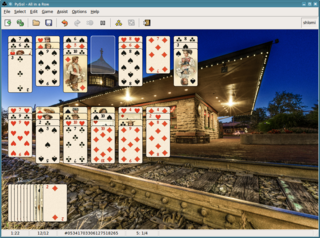 W
WAll in a Row is a solitaire card game that is akin to Golf and Tri Peaks, and is very similar to Black Hole. The game's objective is to put the entire deck into the foundation.
 W
WBacon, sometimes called American Euchre, is a trick-taking card game which resembles a simplified version of Euchre. It differs from Euchre in that it uses a full 52-card Anglo-American deck, has a slightly modified scoring system and trump selection system, uses a normalized card ordering to make it easier to learn, and adds the aspect of permission. It originated in the mid-to-late 1900s and is somewhat popular in the Eastern United States. It is one of the simpler trick-taking games and is a good game for introducing the concept of trumps to inexperienced players.
 W
WBaker's Dozen is a solitaire card game using a deck of fifty-two playing cards. The game is so called because of the 13 columns in the game, the number in a baker's dozen.
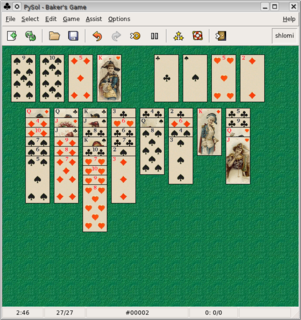 W
WBaker's Game is a patience or solitaire card game similar to FreeCell. It predates FreeCell, and differs from it only in the fact that sequences are built by suit, instead of by alternate color. This makes the game more difficult to complete successfully.
 W
WBid Euchre, Auction Euchre, Pepper or Hasenpfeffer, is the name given to a group of card games played in North America based on the game Euchre. It introduces an element of bidding in which the trump suit is decided by which player can bid to take the most tricks. The primary differences are the number of cards dealt, absence of any undealt cards, the bidding and scoring process, and the addition of a no trump declaration. It is typically a partnership game for four players, played with a 24, 32 or 36-card pack, or even two decks of 24 cards each. It should not be confused with another game also called Bid Euchre q.v. Five Hundred.
 W
WBid whist is a partnership trick-taking variant of the classic card game whist. As indicated by the name, bid whist adds a bidding element to the game that is not present in classic whist. It is generally accepted that the game of bridge came from the game of whist. Bid whist, along with spades, remains popular particularly in U.S. military culture and a tradition in African-American culture with probable roots in the period of slavery in the United States.
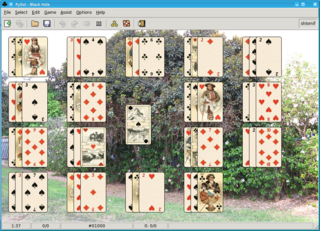 W
WBlack Hole is a patience or solitaire card game with game-play similar to Golf and Tri Peaks, but with a tableau of fans similar to La Belle Lucie. Invented by David Parlett, this game's objective is to compile the entire deck into one foundation.
 W
WBlackjack, formerly also Black Jack and Vingt-Un, is the American member of a global family of banking games known as Twenty-One, whose relatives include the British game of Pontoon and the European game, Vingt-et-Un. It is a comparing card game between one or more players and a dealer, where each player in turn competes against the dealer. Players do not compete against each other. It is played with one or more decks of 52 cards, and is the most widely played casino banking game in the world.
 W
WBluke or Blook is a trick-taking card game known to parts of the East Coast and the Midwest and possibly other parts of the United States of America. The game features use of the Jokers, which are sometimes referred to as the Blukes.
 W
WCheat is a card game where the players aim to get rid of all of their cards. It is a game of deception, with cards being played face-down and players being permitted to lie about the cards they have played. A challenge is usually made by players calling out the name of the game, and the loser of a challenge has to pick up every card played so far. Cheat is classed as a party game. As with many card games, cheat has an oral tradition and so people are taught the game under different names.
 W
WCalculation is a solitaire card game played with a standard pack of 52 cards. It is part of the Sir Tommy family of patience games. It has its origin in France, where it is known as La Plus Belle.
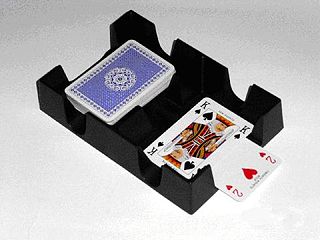 W
WCanasta is a card game of the rummy family of games believed to be a variant of 500 Rum. Although many variations exist for two, three, five or six players, it is most commonly played by four in two partnerships with two standard decks of cards. Players attempt to make melds of seven cards of the same rank and "go out" by playing all cards in their hand. It is "the most recent card game to have achieved worldwide status as a classic".
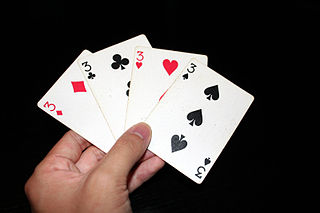 W
WCarioca is a chilean card game similar to Rummy style card games with many variations. The variation described below is Perla's Cariocas.
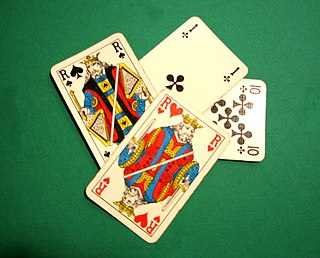 W
WEvansville Clabber is a four-player trick-taking card game that is played in southwestern Indiana near Evansville. Clabber is a member of the Jack-Nine family of trick-taking card games that are popular in Europe. The game is a four player variation similar to that of klaberjass. The game also plays similar to Euchre, with a few differences being that points are not awarded based on the number of tricks taken, but rather on the actual point value of cards in those tricks. Clabber also doesn't use a left Bower, as does Euchre; other differences are that players don't use Bidding, instead, the trump makers must score at least eighty-two points to keep from "going set", where they don't score any of their points. Additional points can also be scored for a combination of cards in a hand, which would assist in "making it", or, not going set.
 W
WConquian, Coon Can or Colonel is a rummy-style card game. David Parlett describes it as an ancestor to all modern rummy games, and a kind of proto-gin rummy. Before the appearance of gin rummy, it was described as "an excellent game for two players, quite different from any other in its principles and requiring very close attention and a good memory to play it well".
 W
WContinental Rummy is a progressive partnership Rummy card game related to Rumino. It is considered the forerunner of the whole family of rummy games using two packs of cards as one. Its name derives from the fact that it is played throughout the continental Europe, the United States, Mexico, Canada, and also in South America. According to Albert Morehead, it was "at one time the most popular form of Rummy in women's afternoon games, until in 1950 it lost out to Canasta."
 W
WContract bridge, or simply bridge, is a trick-taking card game using a standard 52-card deck. In its basic format, it is played by four players in two competing partnerships, with partners sitting opposite each other around a table. Millions of people play bridge worldwide in clubs, tournaments, online and with friends at home, making it one of the world's most popular card games, particularly among seniors. The World Bridge Federation (WBF) is the governing body for international competitive bridge, with numerous other bodies governing bridge at the regional level.
 W
WCraits is a shedding card game for two to five players. It was invented in the 1970s in Cambridge, Massachusetts, and is derived from Crazy Eights, which forms the origin of its name.
 W
WCrazy Eights is a shedding-type card game for two to seven players. The object of the game is to be the first player to discard all of his or her cards. The game is similar to Switch and Mau Mau.
 W
WDesmoche is a popular rummy card game usually played for small stakes which closely resembles other games in the rummy family, like Conquian and gin rummy, more than poker. It was probably devised in Nicaragua in the first half of the 20th century.
 W
WEleusis is a shedding-type card game where one player chooses a secret rule to determine which cards can be played on top of others, and the other players attempt to determine the rule using inductive logic.
 W
WEuchre or eucre is a trick-taking card game commonly played in Australia, Canada, New Zealand, Great Britain, and the United States. It is played with a deck of 24, 28, or 32 standard playing cards. Normally there are four players, two on each team, although there are variations that range from two to nine players.
 W
WEuchre has many variations in game playing. Some of them are designed for two, three, five or more players. Below is an incomplete list of major notable variations of the game.
 W
WEuchre is a 19th-century trick-taking card game and has many variations.
 W
WFlaps is a commercial card game released in 2010, and is a shedding-type card game for two or more players. It is based on the game two four jacks, using a custom deck of cards written in both English and Czech. The game has seven levels, each level adding new functionality.
 W
WForty-Fives is a trick-taking card game that originated in Ireland. The game is popular in many communities throughout Atlantic Canada as well as the Gaspé Coast in Québec. Forty-fives is also played in parts of Massachusetts and southern New Hampshire in New England, United States, as well as in the South Island of New Zealand.
 W
WFreeCell is a solitaire card game played using the standard 52-card deck. It is fundamentally different from most solitaire games in that very few deals are unsolvable, and all cards are dealt face-up from the very beginning of the game. Although software implementations vary, most versions label the hands with a number.
 W
WFrog is a trick-taking, card game for 3 players that is popular in southern USA and Mexico. It is a member of the Tapp group of games that originate from the attempt to play tarot card games with non-tarot cards, the most likely progenitor of these games being Tapp Tarock.
 W
WGin rummy, or simply gin, is a two-player card game created in 1909 by Elwood T. Baker and his son C. Graham Baker. It is a variant of rummy. It has enjoyed widespread popularity as both a social and a gambling game, especially during the mid twentieth century, and remains today one of the most widely-played two-player card games.
 W
WGolf is a card game where players try to earn the lowest number of points over the course of nine deals.
 W
WGolf is a patience or solitaire card game where players try to earn the lowest number of points over the course of nine deals. It has a tableau of 35 face-up cards and a higher ratio of skill to luck than most other solitaire card games. Its easy game-play also makes it within easy reach of first-timers, while still offering scope for strategic play.
 W
WKaiser, or three-spot, is a trick-taking card game popular in the prairie provinces in Canada, especially Saskatchewan and parts of its neighbouring provinces. It is played with four players in two partnerships with a 32-card deck.
 W
WKlondike is a solitaire card game. In the U.S. and Canada, Klondike is the best-known solitaire card game, to the point that the term "Solitaire", in the absence of additional qualifiers, typically refers to Klondike and is considered as its name. Equally in the UK, it is often just known as "Patience". Elsewhere the game is known as American Patience, as well as Fascination, Triangle or Demon Patience.
 W
WKnock-out Whist or Knockout Whist is a member of the Whist family known by a variety of names including Trumps in Britain, Reduction Whist, Diminishing Whist and Rat. It is often simply called Whist by players who are unfamiliar with the game properly called Whist. It is a basic trick-taking game and is a good way to teach the concept of "tricks" to children.
 W
WLiverpool rummy is a multi-player, multi-round card game similar to other variants of rummy that adds features like buying and going out. It is played the same as Contract Rummy, except that if a player manages to cut the exact number of cards required to deal the hand and leave a face-up card, then the cutting player's score is reduced by 50 points.
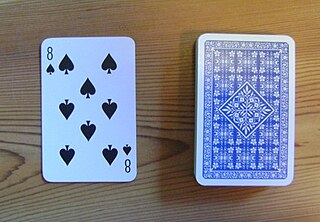 W
WMao is a card game of the shedding family. The aim is to get rid of all of the cards in hand without breaking certain unspoken rules which tend to vary by venue. The game is from a subset of the Stops family and is similar in structure to the card game Uno or Crazy Eights.
 W
WNewmarket is an English card game of the matching type for any number of players. It is a domestic gambling game, involving more chance than skill, and emerged in the 1880s as an improvement of the older game of Pope Joan. It became known in America as Stops or Boodle before developing into Michigan. In 1981, Newmarket was still the sixth most popular card game in Britain.
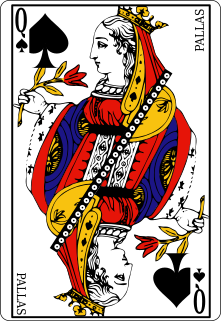 W
WMille is a two-player card game requiring two standard 52-card decks. Mille is a rummy game similar to canasta in the respects that if a player picks up cards from the discard pile, the player picks up the entire pile, and the only legal melds are three or more cards of a same rank.
 W
WNerts (US), Pounce (US) or Racing Demon (UK) is a fast-paced, multiplayer card game involving multiple decks of playing cards. It is often described as a combination of the card games Speed and Solitaire.
 W
WNewmarket is an English card game of the matching type for any number of players. It is a domestic gambling game, involving more chance than skill, and emerged in the 1880s as an improvement of the older game of Pope Joan. It became known in America as Stops or Boodle before developing into Michigan. In 1981, Newmarket was still the sixth most popular card game in Britain.
 W
WNinety-nine is a simple card game based on addition and reportedly popular among the Romani people. It uses one or more standard decks of Anglo-American playing cards in which certain ranks have special properties, and can be played by any number of players. During the game, the value of each card played is added to a running total which is not allowed to exceed 99. A player who cannot play without causing this total to surpass 99 loses that hand and must forfeit one token.
 W
WPinochle, also called pinocle or penuchle, is a trick-taking, Ace-Ten card game typically for two to four players and played with a 48-card deck. It is derived from the card game bezique; players score points by trick-taking and also by forming combinations of cards into melds. It is thus considered part of a "trick-and-meld" category which also includes the game belote. Each hand is played in three phases: bidding, melds, and tricks. The standard game today is called "partnership auction pinochle".
 W
WPoker is any of a number of card games in which players wager over which hand is best according to that specific game's rules in ways similar to these rankings. Often using a standard deck, poker games vary in deck configuration, the number of cards in play, the number dealt face up or face down, and the number shared by all players, but all have rules which involve one or more rounds of betting.
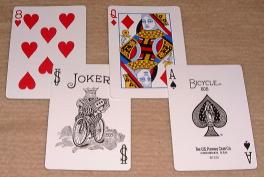 W
WPonytail Canasta is a variation of the card game Canasta. The rules for Canasta were standardized in North America around the 1950s, it was this version of the game that gained worldwide popularity. In many countries, Classic Canasta is still played in more or less its original form, sometimes alongside a number of variations.
 W
WPresident is a westernized version of an originally Japanese card game named daifugō or daihinmin. It is a game for three or more, in which the players race to get rid of all of the cards in their hands in order to become "president" in the following round.
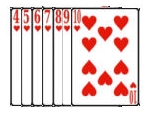 W
WRumino is a knock rummy card game of Italian origin played up to 6 players in which players try to form sets or sequences of cards. It may possibly have been devised in American during the 1940s by Italian immigrants by adapting the game Scala Quaranta to Gin rummy. It is usually played for small stakes Two 52-card decks are used plus four Jokers comprising 108 cards.
 W
WSheepshead or Sheephead is an American trick-taking card game derived from Bavaria's national card game, Schafkopf. Sheepshead is most commonly played by five players, but variants exist to allow for two to eight players. There are also many other variants to the game rules, and many slang terms used with the game.
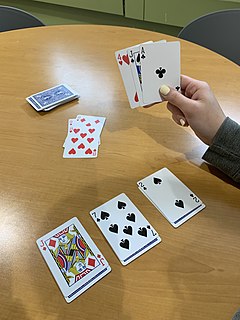 W
WPoohead is a card game, the object of which is to lose all of one's playing cards, with the final player being the "shithead". The game became popular among backpackers in the late 20th century. Although the basic structure of the game generally remains constant, there are regional variations to the game's original rules.
 W
WSlobberhannes is a trick-taking, American card game, possibly of German origin, for four players, in which the aim is to avoid taking the first and last tricks and the queen of clubs. Hoyle's describes it as "really quite an excellent game for the family circle" that "can be played with equal enjoyment either for counters or for small stakes."
 W
WSnap is a popular card game in which players deal cards and react quickly to spot pairs of cards of the same rank. Cards are either dealt into separate piles around the table, one per player, or into a single shared pile.
 W
WSpades is a trick-taking card game devised in the United States in the 1930s. It can be played as either a partnership or solo/"cutthroat" game. The object is to take the number of tricks that were bid before play of the hand began. Spades is a descendant of the Whist family of card games, which also includes Bridge, Hearts, and Oh Hell. Its major difference as compared to other Whist variants is that, instead of trump being decided by the highest bidder or at random, the Spade suit always trumps, hence the name.
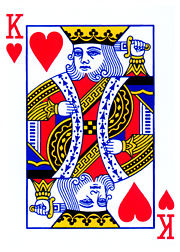 W
WThe King of Hearts Has Five Sons is a little-known, but traditional American deduction card game, but is interesting because its methodology is reflected in the well-known board game of Cluedo, which means that it might be a predecessor.